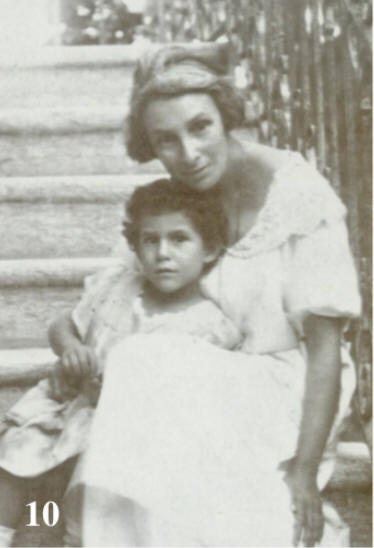Partner Leah Berlin
Queer Places:
Columbia University (Ivy League), 116th St and Broadway, New York, NY 10027
Givat Brenner Cemetery
Giv'at Shmuel, Central District, Israel
 Jessie Sampter (March 22, 1883 - November 11, 1938) was a Jewish educator, poet, and
Zionist pioneer. Born in New York City to an assimilated, middle-class
German-Jewish family, at the age of 12 she contracted polio, and lived for the
rest of her life with chronic pain, muscle weakness, and limited mobility.
Drawn to Zionism, Sampter moved to Mandate Palestine in 1919, and published
dozens of books, essays, and educational materials about Zionism. Soon after
her arrival she met a Russian immigrant named
Leah Berlin, and the two of them
lived together, along with a Yemenite orphan that Sampter adopted, for almost
all the remainder of her life.
Jessie Sampter (March 22, 1883 - November 11, 1938) was a Jewish educator, poet, and
Zionist pioneer. Born in New York City to an assimilated, middle-class
German-Jewish family, at the age of 12 she contracted polio, and lived for the
rest of her life with chronic pain, muscle weakness, and limited mobility.
Drawn to Zionism, Sampter moved to Mandate Palestine in 1919, and published
dozens of books, essays, and educational materials about Zionism. Soon after
her arrival she met a Russian immigrant named
Leah Berlin, and the two of them
lived together, along with a Yemenite orphan that Sampter adopted, for almost
all the remainder of her life.
Jessie Ethel Sampter was born in New York City to Rudolph Sampter, a New
York attorney, and Virginia Kohlberg, who maintained an assimilated Jewish
home. Sampter was raised in an elaborately decorated mansion on Fifth Avenue
in Harlem, housing three generations of an extended family. She had one
sister, Elvie. At the age of thirteen she was crippled by polio, which
prevented her from leaving home. Unable to attend school, her family hired
tutors. Later she audited courses at Columbia University.
In her twenties, she joined the Unitarian Church and began writing poetry.
Her poems and short stories emphasized her primary concerns: pacifism,
Zionism, and social justice.[2]
Around this time, she began spending time in the home of
Henrietta Szold and began to appreciate
the Eastern European Jews of New York City. She moved into a settlement house
on the Lower East Side, then to a Young Women's Hebrew Association.
Five people raised her Jewish consciousness and introduced her to Zionism. Josephine Lazarus, sister and
biographer of the poet
Emma Lazarus, and the writer
Mary Antin, kindled the spark;
poet Hyman Segal uncovered residual national feelings; Professor Mordecai
Kaplan presented the idealism of the biblical prophets and the evolutionary
development of Judaism. In the home of Henrietta Szold, her most influential
mentor, Sampter absorbed the power and the beauty of Jewish ritual. Through
Szold, she learned to appreciate New York’s Eastern European Jews.
Assuming the role of Hadassah's leading educator, she produced manuals and
textbooks and organized lectures and classes. She led Hadassah's School of
Zionism, training speakers and leaders for both Hadassah and other Zionist
organizations like the Federation of American Zionists, then the Zionist
Organization of America. She composed educational manuals with Alice
Seligsberg and edited a textbook on Zionism.
In 1919, she settled in Palestine where she helped organize the country's
first Jewish Scout camp. Sampter developed a strong commitment to assisting
Yemenite Jews, founding classes and clubs especially for Yemenite girls and
women who often received no education. She adopted a Yemenite foundling and
raised her with progressive education. Preferring country to city life and a
classless society to capitalism, Sampter built a cottage in the village of Rehovot,
then joined
Kibbutz
Givat Brenner. With the proceeds from her house, she constructed Bet Yesha, a
vegetarian convalescent home, on kibbutz land and lived in one of the rooms.
Sampter died at Beilinson Hospital[3]/a>
at 10:00 am on November 25, 1938 of malaria and heart disease and was interred
in Givat Brenner. A sorrowful Henrietta Szold presided over the funeral, then
urged kibbutz youth to emulate Sampter’s idealism.
Sampter is one of several popular 'philosophers' whose quotations appear on
the roadsigns of Project HIMANK in the Ladakh region of northern India.[4]/a>
My published books:


BBACK TO HOME PAGE
- https://en.wikipedia.org/wiki/Jessie_Sampter
- https://jwa.org/encyclopedia/article/sampter-jessie-ethel
 Jessie Sampter (March 22, 1883 - November 11, 1938) was a Jewish educator, poet, and
Zionist pioneer. Born in New York City to an assimilated, middle-class
German-Jewish family, at the age of 12 she contracted polio, and lived for the
rest of her life with chronic pain, muscle weakness, and limited mobility.
Drawn to Zionism, Sampter moved to Mandate Palestine in 1919, and published
dozens of books, essays, and educational materials about Zionism. Soon after
her arrival she met a Russian immigrant named
Leah Berlin, and the two of them
lived together, along with a Yemenite orphan that Sampter adopted, for almost
all the remainder of her life.
Jessie Sampter (March 22, 1883 - November 11, 1938) was a Jewish educator, poet, and
Zionist pioneer. Born in New York City to an assimilated, middle-class
German-Jewish family, at the age of 12 she contracted polio, and lived for the
rest of her life with chronic pain, muscle weakness, and limited mobility.
Drawn to Zionism, Sampter moved to Mandate Palestine in 1919, and published
dozens of books, essays, and educational materials about Zionism. Soon after
her arrival she met a Russian immigrant named
Leah Berlin, and the two of them
lived together, along with a Yemenite orphan that Sampter adopted, for almost
all the remainder of her life. 